

 |

|
ADMINISTRATIVE REPORT
Date: June 2, 2000
Author/Local: W. Chou/7913
RTS No.: 01510
CC File No. 113CS&B: June 22, 2000
TO:
Standing Committee on City Services and Budgets
FROM:
General Manager of Engineering Services in consultation with the Vancouver Police Department (VPD) & the Division of Legal Services
SUBJECT:
Small Motorized Vehicles
RECOMMENDATION
A. THAT the Street and Traffic Bylaw be amended to prohibit the use of any motorized push-scooters, motorized skateboards or other similar small motorized vehicles on any street or other public place;
B. THAT the Street and Traffic By-Law be amended to authorize Police to seize and detain such motorized push-scooters, motorized skateboards or other small motorized vehicles if used on streets in contravention of the prohibition referred to in A, and to authorize appropriate fines as set out in the by-law;
C. THAT Staff notify the public of the prohibition of any small motorized vehicle on public property through advertisements, at a cost of $5,000 from the Contingency Reserve Account; and
D. THAT a recommendation be sent to the Union of British Columbia Municipalities (UBCM) to encourage the Province to develop standards and testing for noise and emissions from mopeds.
COUNCIL POLICY
The Street and Traffic By-Law prohibits any person from propelling any vehicle (except light carriages or chairs for the conveyance of children or disabled), along, over, or across any sidewalk or boulevard except where it is specially constructed for vehicular traffic.
PURPOSE
On October 5, 1999, Council’s Standing Committee on Transportation and Traffic passed a motion to regulate and enforce the use of small-engine vehicles. Council then directed staff to report back on the regulative authority needed to implement and enforce such action, as in Appendix A.
SUMMARY
The intent of this report is to review the status of small motorized vehicles on public property, and to recommend alternatives. Also, it is recommended that the UBCM encourage the Province to develop standards to regulate noise and emissions generated from mopeds.
DISCUSSION
Small engine vehicles are relatively inexpensive, convenient to operate and are emerging as alternative modes of personal transportation. However, some of these vehicles are unlicensed and have no standards for noise and emission control. Some of these vehicles which have recently risen in popularity include motorized push-scooters, motorized skateboards, motor-assisted bicycles, and mopeds (as shown in Appendix B).
Figure 1 Motorized Push-Scooters
Motorized push-scooters, as shown in Figure 1, have recently become a popular form of transportation because they are light weight, require very little storage space, and are convenient and low cost to operate. This vehicle is essentially a push-scooter powered by a small motor. One of the more popular types of motorized push-scooters is the Go-ped.
Typical specifications of a motorized push-scooter
Weight: 10 kg
Motor: 22 cc, two stroke engine
Fuel: gas/oil mix (typically 40:1 gasoline to oil mixture)
Milage: up to 40 km per litre
Max. Speed: 30 km/h
Although the small, two stroke engines used on these vehicles are fuel efficient, they can generate relatively high levels of hydrocarbon emissions and a high-pitched noise during operation. Tests conducted by the U.S. Environmental Protection Agency, as shown in Appendix C, showed that the emissions generated from two stroke lawnmower, chain saw, and outboard engines in one hour is equivalent to a vehicle travelling hundreds of kilometres.
With the speeds that these vehicles can attain, the use of them in any public place can be potentially hazardous to the operator and nearby members of the public. In addition, the emissions and noise generated by these vehicles can adversely affect the quality and comfort of the lives of citizens.
Presently, regulations in the Motor Vehicle Act prohibit the use of small motorized push-scooters on City streets. In the event that they are used on the street, Police can charge and fine the operator with a Vehicle Non-Compliance Offence ($86). In addition, existing regulations in the City’s Street and Traffic By-Law prohibit driving any vehicle on sidewalks or boulevards. However, there are no regulations to prohibit the use of vehicles on other public property such as seawalls, public plazas, and statutory rights of way.
As a result, staff recommend an amendment to the Street and Traffic By-Law to extend the existing prohibition to include the use of small motorized vehicle on any public property, and to authorize Police to seize and detain these vehicles if used in contravention of the prohibition.
Figure 2
Motorized Skateboards
A motorized skateboard, as shown in Figure 2, is a skateboard equipped with a small motor for propulsion. This vehicle is like a motorized push-scooter except it does not have handle bars for control.
Regulations in the Motor Vehicle Act and Street and Traffic By-Law prohibit the use of motorized skateboards on any City street, sidewalk, or boulevard. In the event that they are used on the street, Police can charge and fine the operatorwith a Vehicle Non-Compliance offence ($86). However, like motorized push-scooters, there are no regulations in the Street and Traffic By-Law to prohibit the use of a motorized skateboard on other public property such as seawalls, public plazas, and statutory right of ways.
Motorized skateboards can be potentially hazardous if used on public property. Therefore, staff recommend an amendment to the Street and Traffic By-Law to prohibit the use of any small motorized vehicle on any public property, and to authorize Police to seize and detain these vehicles if used in contravention of the prohibition.
Motor-Assisted Bicycles
Figure 3
As shown in Figure 3, motor-assisted bicycles are bicycles modified with an electric or gas motor for propulsion. The electric motor is intended to be used as a secondary source of power to assist the operator when necessary. Therefore, expanding the range of people who can use bicycling as an alternative form of transportation.
Typical specifications of electric or gas motor-assisted bicycle
Weight: approximately 15 kg added to the bicycle
Motor: 24 volt, DC motor or 50 cc gas powered, 2 stroke engine
Fuel: battery powered or gas/oil mix (50:1 gasoline to oil)
Milage: up to 30 km
Max. Speed: 30 km/h
The electric motors produce zero emissions during operation and have a quiet propulsion system. Gas powered motors on motor-assisted bicycles are similar to the ones used on motorized push-scooters and can generate relatively high levels of hydrocarbon emissions and a high-pitched noise during operation.
Presently, electric and gas powered motor-assisted bicycles must be registered,licensed, and insured with the Insurance Corporation of British Columbia (ICBC) as a Limited-Speed Motorcycle in order to be permitted on City streets. The operator is required to have a driver’s licence and wear a motorcycle helmet during operation. Therefore, motor-assisted bicycles are treated as motor vehicles and are not permitted on sidewalks, boulevards, or bike paths such as the seawall.
At this time, ICBC is considering an amendment to the Motor Vehicle Act to re-designate electric motor-assisted bicycles as bicycles such that they would not need to be treated as Limited-Speed Motorcycles. Electric motor-assisted bicycles would then be permitted on bike paths such as the seawall, but not sidewalks or boulevards. The British Columbia Cycling Coalition is aware of this action and supports it if motor-assisted bicycles are:
· powered by electric motors;
· electric motor is used only as a secondary source of power; and
· limited to a maximum speed of 20 km/h while under power.
Figure 4
MopedsMopeds, as shown in Figure 4, are very similar to motorcycles, but mopeds are lighter and have smaller engines than motorcycles. Some mopeds are propelled by electric motors, although gas powered mopeds are more common.
Typical specifications of a gas powered moped
Weight: 45 kg
Motor: 50 cc or smaller, two stroke engine
Fuel: gas/oil mix (typically 50:1 gasoline to oil mixture)
Milage: up to 35 km per litre
Max. Speed: 70 km/h
The two stroke engines used on gas powered mopeds are similar to those on motorized push-scooters. These engines operate on a gasoline/oil mix which can generate relatively high levels of hydrocarbon emissions and a high-pitched noiseduring combustion. Despite these concerns, there are no standards for testing emissions from these vehicles as they are exempt from AirCare testing.
At this time, a moped must be registered, licensed, and insured with ICBC as a Limited-Speed Motorcycle in order to be permitted on City streets. The operator is required to have a driver’s license and wear a motorcycle helmet during operation.
On February 8, 1999, the Greater Vancouver Regional District (GVRD) Board made a recommendation to TransLink to consider the testing of motorcycles for inclusion in the AirCare program. As a result of this recommendation, options are now being considered for motorcycle and limited-speed motorcycle emissions testing along with an analysis of its costs and benefits.
In order to address concerns with noise and emissions from gas powered mopeds, staff recommend that Council make a recommendation to the UBCM to encourage the Province to develop standards and methods of testing noise and emissions from mopeds.
CONCLUSIONS
The use of motorized push-scooters, motorized skateboards, and other small motorized vehicles on public property can be potentially hazardous to the operator and others. Regulations in the Motor Vehicle Act and Street and Traffic By-Law already prohibit the use of small motorized vehicles on any City street, sidewalk, or boulevard. However, there are currently no regulations in place to prohibit the use of these vehicles on other public property such as seawalls, public plazas, and statutory right of ways. Staff recommend an amendment to the Street and Traffic By-Law to prohibit the use of any small motorized vehicle on any public property, and to authorize Police to seize and detain these vehicles if used in contravention of the prohibition.
As members of the public may not be aware of the prohibition, staff recommend that the public be notified through advertisements that the use of any small motorized vehicle on any public property is prohibited.
-7-
ICBC is now planning to amend the Motor Vehicle Act to re-designate electric motor-assisted bicycles as bicycles such that they would not need to be registered, licensed, and insured with ICBC. Electric motor-assisted bicycles would then be allowed on bike paths such as the seawall. The British Columbia Cycling Coalition supports this action as it will expand the range of people who can embrace bicycling as an alternative form of transportation.
Mopeds are regulated in British Columbia under the control of ICBC and are designated as Limited-Speed Motorcycles. In order for a moped to be permitted on City streets it must be registered, licensed, and insured with ICBC. Although gas powered moped engines can generate relatively high levels of hydrocarbon emissions and a high-pitched noise during operation, there are currently no standards for testing the noise and emissions from mopeds. It is recommended that the UBCM encourage the Province to develop standards for testing noise and emissions from mopeds.
* * * * *
APPENDIX A
“Motion # 1 - Small-Engine Vehicles RTS#1055 File: 3755
MOVED by Cllr. Price,
SECONDED by Cllr. Herbert
WHEREAS Vancouver is committed to building livable high-density communities, excessive noise from vehicles can severely affect the quality of life for residents;
AND WHEREAS regulation and enforcement remain particular problems (e.g. noisy motorcycles);
AND WHEREAS Go-Peds (scooters with small motors) are emerging as a transportation alternative but are currently unregulated and unlicensed;
AND WHEREAS gas-powered small motors, whether on scooters, bikes or mopeds, can produce a high-pitched and obnoxious noise (like leaf-blowers on wheels) and have no emission controls;
AND WHEREAS the rapid proliferation of such noisy and polluting vehicles would override their utility as a transportation alternative;
BE IT RESOLVED THAT such vehicles be prohibited until such time as they are equipped with quiet, low- or zero-emission engines (preferably electric motors); and that such vehicles be properly licensed and inspected;
AND THAT City staff report on the regulatory authority needed to implement and enforce such action.
- CARRIED UNANIMOUSLY”
APPENDIX B
Motorized Push-Scooters
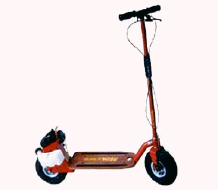
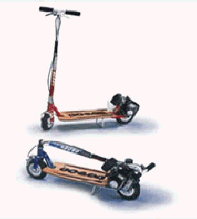
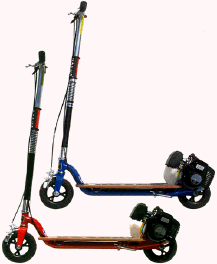
Motorized Skateboards
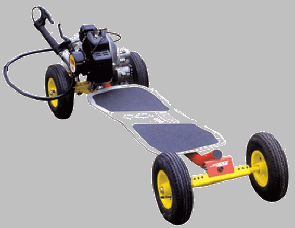
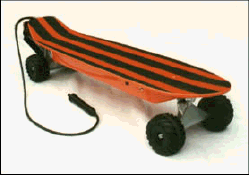
Motor-Assisted Bicycles
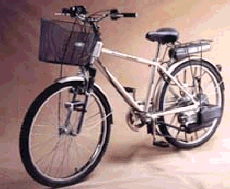
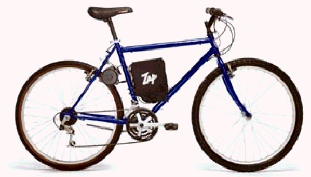
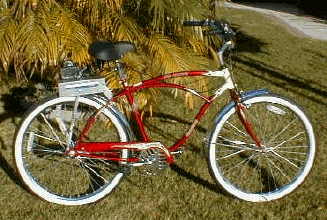
Motor-Assisted Bicycles
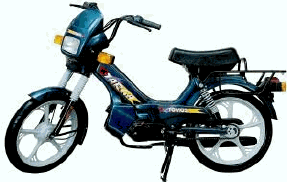
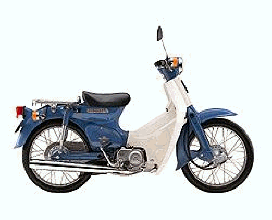
APPENDIX C
Copy of file in the City Clerk’s Office
![[City Homepage]](/graphics/footnava.gif)
|
![[Get In Touch]](/graphics/footnavb.gif)
|

|

|

|
(c) 1998 City of Vancouver